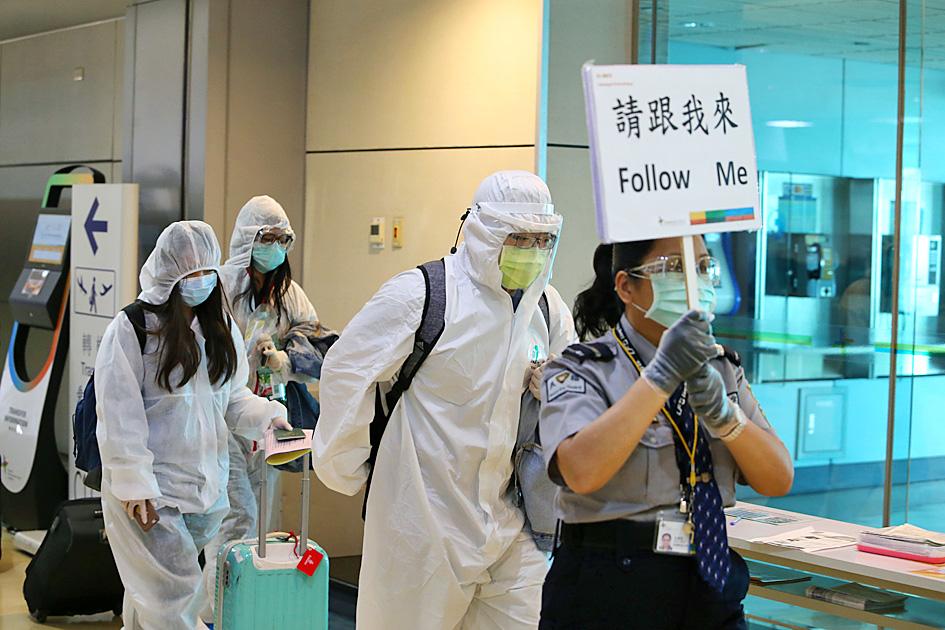A total of 116 Taiwanese yesterday morning arrived home from Warsaw on board a charter flight operated by LOT Polish Airlines, after being stranded in the European country for months due to the COVID-19 pandemic.
It was also the first-ever direct passenger flight between Taiwan and Poland, said the Polish Office in Taipei, the de facto Polish embassy in Taiwan in the absence of diplomatic relations.
The two countries signed an air transport agreement in March 2015.

Photo: Tony Yao, Taipei Times
The airplane landed at Taiwan Taoyuan International Airport at 6:24am after a 13-hour flight.
The plane had to make a three-hour detour, as it was not allowed to fly over China.
The passengers, mostly students and businesspeople, were quarantined upon arrival for 14 days in accordance with the Central Epidemic Command Center’s instructions after undergoing initial health checks.
The charter flight was made possible through the efforts of Lin’s International Consulting Co Ltd, an overseas student service, and coordination between Taiwan’s Civil Aeronautics Administration and LOT.
It took the parties involved three to four weeks to arrange the charter flight, Lin’s International said.
There would be three more such flights to evacuate Taiwanese from Poland in the near term, the company said.
Without the charter flights, the Taiwanese in Poland would have had to travel to Germany by land for more than 10 hours before they could board a flight home, which could increase the risk of infection, it added.
The Taoyuan airport assigned ground personnel and cleaning staff as early as 2am to prepare for the arrival and arranged six buses to take the passengers to designated quarantine centers.

The US government has signed defense cooperation agreements with Japan and the Philippines to boost the deterrence capabilities of countries in the first island chain, a report by the National Security Bureau (NSB) showed. The main countries on the first island chain include the two nations and Taiwan. The bureau is to present the report at a meeting of the legislature’s Foreign Affairs and National Defense Committee tomorrow. The US military has deployed Typhon missile systems to Japan’s Yamaguchi Prefecture and Zambales province in the Philippines during their joint military exercises. It has also installed NMESIS anti-ship systems in Japan’s Okinawa

‘WIN-WIN’: The Philippines, and central and eastern European countries are important potential drone cooperation partners, Minister of Foreign Affairs Lin Chia-lung said Minister of Foreign Affairs Lin Chia-lung (林佳龍) in an interview published yesterday confirmed that there are joint ventures between Taiwan and Poland in the drone industry. Lin made the remark in an exclusive interview with the Chinese-language Liberty Times (the Taipei Times’ sister paper). The government-backed Taiwan Excellence Drone International Business Opportunities Alliance and the Polish Chamber of Unmanned Systems on Wednesday last week signed a memorandum of understanding in Poland to develop a “non-China” supply chain for drones and work together on key technologies. Asked if Taiwan prioritized Poland among central and eastern European countries in drone collaboration, Lin

Renewed border fighting between Thailand and Cambodia showed no signs of abating yesterday, leaving hundreds of thousands of displaced people in both countries living in strained conditions as more flooded into temporary shelters. Reporters on the Thai side of the border heard sounds of outgoing, indirect fire yesterday. About 400,000 people have been evacuated from affected areas in Thailand and about 700 schools closed while fighting was ongoing in four border provinces, said Thai Rear Admiral Surasant Kongsiri, a spokesman for the military. Cambodia evacuated more than 127,000 villagers and closed hundreds of schools, the Thai Ministry of Defense said. Thailand’s military announced that

NO CONFIDENCE MOTION? The premier said that being toppled by the legislature for defending the Constitution would be a democratic badge of honor for him Premier Cho Jung-tai (卓榮泰) yesterday announced that the Cabinet would not countersign the amendments to the local revenue-sharing law passed by the Legislative Yuan last month. Cho said the decision not to countersign the amendments to the Act Governing the Allocation of Government Revenues and Expenditures (財政收支劃分法) was made in accordance with the Constitution. “The decision aims to safeguard our Constitution,” he said. The Constitution stipulates the president shall, in accordance with law, promulgate laws and issue mandates with the countersignature of the head of the Executive Yuan, or with the countersignatures of both the head of the Executive Yuan and ministers or